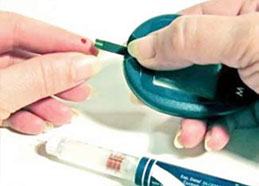Diabetes Insurance for You and Your Children
The principal source of energy and growth for our body is sugar, present in the form of glucose in our blood. Whatl we eat is changed in glucose, which in itself is unable to enter living cells; it is here the important role of insulin comes in, which breaks glucose down so that it can be absorbed in living tissues.
Pancreas produces a hormone known as insulin, which lowers the level of sugar in the blood. Without enough insulin in the blood or in case the pancreas is not functioning properly, the sugar stays in the blood which ultimately leads to diabetes. The cells are deprived of the cells are deprived of essential energy required for growth plus there is excess amounts of glucose build up in the blood.
There are mainly three forms of diabetes:
- Type 1 diabetes – no production of insulin at all.
- Type 2 diabetes – the pancreas is unable to produce enough insulin or it is not functioning properly.
- Gestational diabetes – diabetes developed just during pregnancy.
Although excess amounts of glucose are passed out through urine, still enough remains to cause harm over time.
It is an interesting fact that in ancient China it was observed thatsome people’s urine attracted ants as it was sweet. So the term “sweet urine disease” was coined.
Diabetes and You
 All forms of diabetes can be controlled but there is still no permanent cure for Type 1 and Type 2 diabetes. In Type 1 diabetes, a patient is injected with insulin, whereas people suffering from Type 2 are treated with tablets and sometimes an insulin injection is also required.
All forms of diabetes can be controlled but there is still no permanent cure for Type 1 and Type 2 diabetes. In Type 1 diabetes, a patient is injected with insulin, whereas people suffering from Type 2 are treated with tablets and sometimes an insulin injection is also required.
As per the American Diabetes Association statistics of the year 2007, almost 17.9 million individuals are suffering from diabetes. With the ever increasing cost of health care, millions of people are faced with the dilemma to reduce the expenditure on their diabetes or to continue with the required treatment for their illness.
Without a health policy the danger of being buried under debt due to medical expenses is right on the horizon. Low or middle income earners, retired and newly unemployed people are facing this same situation.
Diabetes is an incurable disease and expenses for its medical care are pretty high, so many medical health insurance companies refuse to provide coverage.
The majority of those who have pre-existing conditions, such as diabetes or cancer, or who have changed their employment status, are usually disqualified by health insurance companies.
The Way Out
Guaranteed medical health insurance is a solution to all the worries related to diabetes; here people are not refused coverage on the grounds of a pre-existing health condition or employment status. Patients can consult their doctor and identify any illness and the type of coverage that will be required.
Guaranteed issue health coverage helps to take control of sky-rocketing medical bills. Take time out to search and ensure that your health insurance company is actually offering what it promised, by allowing you to avoid healthcare expenses and save your future earnings.
Our services can provide quality health insurance that is surprisingly affordable. Fill in your details online, using the above form and a licensed insurance agent will get in touch with you as soon as possible. They represent all major insurers and will explain you all the options available in this niche health insurance plan.
The most affordable guaranteed medical health insurance plans include doctor’s visits, hospital stays, prescription surgery, blood tests, X-rays, emergency room services, and much more. People who already have health insurance can get increased coverage and lower monthly premiums through our services.
Legal Protection for People with Diabetes
Legal protection mainly depends on the policy purchased by an individual. In forty six states, individual and small market insurance policies must cover diabetes medications, services and supplies. The enrollee can also file a complaint with the insurance commissioner of the concerned state if he or she is not provided coverage for the necessary items.
Special group and large policy holders must consult with the benefits manager before they file an appeal for the denied coverage. Each type of policy provides diabetes coverage for a specified level, so special and large enrollees may find it difficult to find coverage for the items in question.
Enrollees of Medicare and Medicaid benefit package should consult their program administrator to determine available benefits. Enrollees can also contact the American Diabetes Association for any assistance at 800-DIABETES.
Diabetic Children and Health Insurance
 People having health insurance coverage should first check their policy to see if their child qualifies as a dependent. Every state has its own definition as to who qualifies as a dependent.
People having health insurance coverage should first check their policy to see if their child qualifies as a dependent. Every state has its own definition as to who qualifies as a dependent.
For example, at times, states have specific rules on dependent status of step children, grand children, disabled children or domestic partners.
Check with your state insurance regulator. In case no state law defines dependent, consult the terms of your insurance policy. In the majority of cases neither individual health insurance plan nor employer sponsored plans are required to offer coverage to dependents like your spouse, domestic partner or children.
Another option is to consult with your state’s department for Insurance in case you are unable to cover your child as a dependent. All fifty states including the District of Columbia have health insurance for children in low income families called S-CHIP.
Many states have come up with a high risk pool in which your child may be eligible in case he or she cannot find coverage under other insurance options, including your state’s children’s health insurance program.